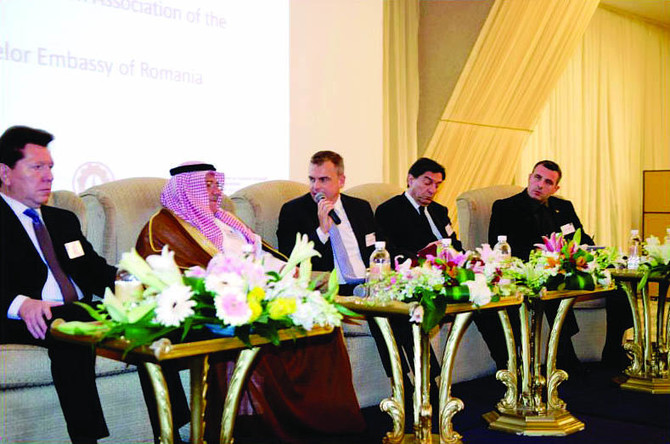The EU-GCC Invest Project held its first automotive conference attended by some 100 local industry leaders and decision-makers at the capital’s Al-Khozama Hotel on Sunday.
“We hope that the local automotive industry benefits from this conference. European Union (EU) companies have a worldwide reputation as technology providers,” Andreas Hergenroether, AHK Saudi Arabia delegate, said as he welcomed the participants. AHK Saudi Arabia organized the conference.
Hergenroether added: “The conference also offers a high potential for technology transfer from EU companies to their local counterparts.”
“European companies have a worldwide reputation for high quality standards of automotive industries. That’s why we decided to hold this conference,” he added.
The conference was part of the EU-GCC Invest Project, which is a joint initiative of the German Emirati Joint Council for Industry and Commerce (AHK UAE) and the AHK Saudi Arabia in cooperation with the Eurochambers and the Federation of GCC Chambers (FGCCC).
Hergenroether noted that that EU GCC Invest Project, which is co-financed by the European Commission (EC), was launched in the beginning of 2012 to promote mutual investment opportunities between the EU and Saudi Arabia.
He added that the conference was the last phase of the GCC-EU Invest project and it served as a platform for potential investors and Saudi decision makers and business partners in the automotive industry.
Hergenroether added that despite the decrease in foreign direct investments (FDI) to the GCC, Saudi Arabia is still the biggest recipient of FDIs in the MENA region in 2012 according to the 2013 World Investment Report by UNCTAD.
“This underlines Saudi Arabia as a global investment destination and testifies to the foreign companies’ trust in the economic growth and stability of the Kingdom,” he said.
He noted that the main EU investors in the Kingdom were France with an FDI volume of $3.821 billion, followed by Germany $2,138 billion and the UK $1,575 billion.
“Although most companies that invested in the GCC were large enterprises, I would like to stress the fact that SMEs (small and medium enterprises) are the backbone of EU economies, which enjoy a global reputation for being technology providers and drivers of innovation,” he said.
He added that SMEs are quite often the hidden champions and technological world market leaders. “For the future, it will remain a challenge how to attract more SMEs to invest to meet the growing demand for technology transfer and know-how,” he said.
The initial phase of the GCC-EU Invest Project consists of an investment survey, analyzing opportunities and challenges regarding inflow of foreign direct investment between the GCC and the EU.
“The purpose of the study, which was published in 2013 was to gain a better understanding about foreign direct investments between the two regions to foster sustainable cooperation,” he said.
He added that it also sought to answer questions such as “What are the major impediments for EU companies investing in the GCC and vice versa?” and “What can be done to create a more favorable investment atmosphere?”
The survey was conducted between May and November 2012 and included questionnaires and structured interviews to both EU businesses which have invested, or have contemplated to invest in the GCC as well as GCC businesses which have invested, or have contemplated to invest directly into production or operations in the EU.
The second phase consists of two symposiums in the Saudi capital and Abu Dhabi to discuss the findings of the survey while the third phase includes training of multiplicators in Abu Dhabi and Riyadh to create a lasting impact.
EU-GCC automotive conference focuses on technology transfer
EU-GCC automotive conference focuses on technology transfer











